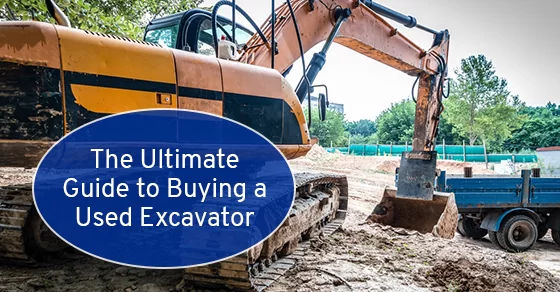There are many important factors to consider when purchasing used equipment. What kind of treatment has the machine received before? How useful is it? Were previous owners kept up to date on maintenance?
Since excavators offer more versatility—the ability to be paired with more attachments, used in more applications, and beneficial to more industries—this rise in popularity is not surprising. The downside for those interested is that increased demand means decreased supply, whether new or used.
Before buying a used excavator, here are five tips to help you.
1. Buyers and sellers meet
For buyers:
Choose a reliable platform or website to screen sellers and increase transaction security.
Learn as much about the seller as possible. You can search the seller’s information, company operating conditions, etc. online to ensure that the other party is true and reliable.
The seller is required to provide pictures of the excavator, maintenance records and other relevant supporting documents.
For sellers:
Provide detailed information on second-hand trading websites, including photos, specifications, maintenance records, etc.
Answer buyer questions. If the buyer has any questions, answer them as detailed and truthfully as possible. Transparent information builds trust.
Make sure the excavator is in good working order to avoid disputes during transactions.
Keep relevant documents. After the transaction is completed, keep the relevant documents and receipts of the excavator for subsequent dispute resolution.
The most important thing is that both buyers and sellers should remain vigilant to avoid fraud or loss during transactions. If possible, it is best to use secured transactions or third-party trading platforms to increase transaction security.
2. Get an early start
The timing of buying a used excavator is something you need to consider. Although not affected by the construction industry, seasonal factors in the agricultural industry can affect the best time to purchase used farm equipment.
Because excavators are so popular, they sell quickly when they hit the second-hand market. A business owner or fleet manager would be wise to look 30 or even 60 days in advance to see if they might need to purchase an excavator.
When deciding what to buy, determine your budget range, including the purchase price, possible repair and modification costs, etc. Choose the right excavator based on your budget.
3. Evaluate the State
To determine the condition of an excavator, ask the seller for a detailed description of the machine’s previous use. For example, what type of projects the excavator was used for before; the year of manufacture and hours of use of the excavator; carefully check whether the excavator has any damage, oil leakage, wear, etc., and try to choose an excavator with complete maintenance and repair records.
Finally, inspect the bucket and glue down the pins and bushings to ensure there is no excessive wear.
4. History and Characteristics
Dig deeper into the machine’s history, including the year it was built, previous owners, usage history, repair and maintenance records, and more. Understand the excavator’s usage history, including main uses, work locations, hours of use, and more. Prolonged, high-frequency use may cause faster wear and tear.
The last feature worth looking at is the machine’s operating time. After 6,000 hours, the machine value begins to decrease significantly. Consider the excavator’s long-term potential in your fleet to determine the impact of its operating hours on the purchase.
If possible, you can ask professional technicians to conduct a technical evaluation of the excavator, including engine performance, hydraulic system, chassis, transmission system, etc.
5. Additional Use Considerations
Second-hand excavators can often be equipped with a variety of add-on components that can be replaced and installed according to project needs. When purchasing a used excavator, you can consider whether you need to purchase these add-ons based on your project needs.
One advantage of used excavators is that they can be equipped with these systems – companies don’t need to buy a whole new machine to get the latest technology. Better yet, look for a used machine that already comes with some kind of automation or machine control guidance technology.
Auxiliary hydraulics are a must-have for users who need to run more attachments, high-flow attachments, and for many hours.
When choosing to purchase a second-hand excavator, follow the principles of safe purchasing, choose trustworthy platforms and sellers, and remain vigilant to ensure the reliability and security of the transaction. Through comprehensive understanding and careful selection, you can find used excavators with stable performance and reasonable prices to provide reliable support for your engineering projects.
Post time: Oct-20-2023


